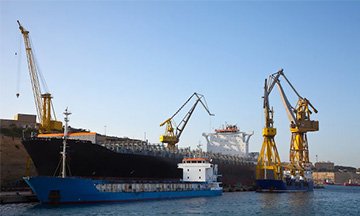Port and Shipping Management Training Course
| Date | Venue | Duration | Fees | |
|---|---|---|---|---|
| 13 May - 17 May, 2024 | Dubai | 5 Days | $4750 | Register |
| 10 Jun - 14 Jun, 2024 | Dubai | 5 Days | $4750 | Register |
| 24 Jun - 26 Jun, 2024 | Amsterdam | 3 Days | $4475 | Register |
| 29 Jul - 02 Aug, 2024 | Dubai | 5 Days | $4750 | Register |
| 19 Aug - 23 Aug, 2024 | Nairobi | 5 Days | $4950 | Register |
| 26 Aug - 30 Aug, 2024 | Dubai | 5 Days | $4750 | Register |
| 23 Sep - 27 Sep, 2024 | Dubai | 5 Days | $4750 | Register |
| 21 Oct - 25 Oct, 2024 | Kigali | 5 Days | $4950 | Register |
| 21 Oct - 25 Oct, 2024 | Dubai | 5 Days | $4750 | Register |
| 25 Nov - 29 Nov, 2024 | Dubai | 5 Days | $4750 | Register |
| 16 Dec - 27 Dec, 2024 | Berlin | 10 Days | $9850 | Register |
| 16 Dec - 20 Dec, 2024 | Dubai | 5 Days | $4750 | Register |
Course Overview
What is Port and Shipping Management?
The management of ports plays a substantial role in managing and controlling transportation cost. It also includes overall delivery time from the source to the last destination and its variability. To this, add freight safety, and reliability of the logistics company, and its throughput.
This Master’s program takes a comprehensive approach to shipping, ports, and freight logistics, offering students a solid academic and business-oriented grasp of the whole transport and supply chain needs. This course is updated, as determined by market demands. Our faculty with a unique combination of academic and practice expertise have experience in the shipping, ports, and international logistics industries. They will present a business and research-informed examination of trends and latest developments, technological advancements, and industry practice in these sectors.
What is port operation process?
The challenges of global trade growth, such as geopolitical shifts and new international regulations, intense competition are part of the port operation process. Rising demands for environmental, social, and economic sustainability, and climate change adaptation needs and technological evolution prospects, form the backbone of this course.
This Zoe training course will equip individuals with the knowledge and expertise required to effectively manage shipping operations and ports. Delegates will be able to respond to the overall transport and supply chain needs in this dynamic and complex environment.
Course Objectives
The main goal of this masterclass is to specifically:
- Provide participants with the most up-to-date procurement operating rules and methods to make project execution easier
- Transform leaners into a qualified manager who can take on management and administrative responsibilities in the shipping sector and related industries
- A solid academic and business-oriented global trade knowledge of overall transportation and supply chain requirements, as determined by market demands.
- A deep understanding of trends and the most recent developments, as well as technological advancements and industrial practices
- Deep awareness about the challenges of global trade growth, such as geopolitical changes and new international regulations and the strategies to overcome concerning issues
- Gain a profound knowledge and expertise required to manage shipping operations and ports effectively,
- Grow to adapt to overall transport and supply chain requirements, in this vibrant and complex environment
Training Methodology
The teaching strategy of the program is primarily lecture-based. Additional teaching strategies include:
- Case Analysis
- Group Discussion
- Workshop
- Seminar
- Fieldwork learning
Like all our acclaimed courses, this masterclass in Port and Shipping Management follows the ‘Do-Review-Learn-Apply’ methodology.
Organisational Benefits
With professionals undergoing this course, organisations will benefit in the ways mentioned below:
- The application of practical and scientific knowledge to port and shipping department managed by trained, experienced professionals
- Ability to identify and articulate marine issues and viable solutions for smooth, Seamless operations
- Development of an inclusive environment where teams can utilize skills and knowledge to produce desired outcomes
- Deep understanding of the importance of ports and shipping in the global logistics supply chain
- A critical examination of goods transported, the types of ships used, and the changes in trade routes due to globalization
- A thorough understanding of various stakeholders & their interests to manage them effectively
- Thorough comprehension of market requirements, application of marketing ideas to promotional strategies and public relations
- A detailed analysis of the port’s cost structure, revenue, and pricing tariffs
- Thorough risk assessment and management to examine potential concerns and put measures to minimize organisational losses
Personal Benefits
Professionals opting for this course will benefit in the below-mentioned ways:
- An aptitude for working effectively in teams and for adopting effective leadership behaviour to have desirable outcomes
- Knowledge of management, professional, and ethical responsibilities
- Complete understanding of Planning, organising, and controlling the port, terminal, and depot
- To manage shipping and shipping ancillary business
- A better understanding of the marine operations, concerned issues, and implementing strategic maritime decisions accordingly
- Profound knowledge about transportation design, routes, and logistics
- Enhanced knowledge about various port administration models and their applicability in diverse situations
- More significant potential to evaluate the significance of maritime safety in the context of environmental management
- Improved knowledge and assurance to appraise competitiveness and competitive dynamics in the port business
- Better resource management skills for effective management of scarce resources and personnel in ports to achieve organisational objectives
Who Should Attend?
- Individuals who want to work in shore-side operations in the global marine sector
- Personnel who want to develop extensive business expertise specializing in shipping and port operations
- Professionals seeking to work for a variety of international logistics and multimodal transportation firms
Course Outline
Module 1 – Introduction to International Trade and Logistics
- Freight transportation
- Historic ports & terminal development
- Trade development history & modern trade flows
- Supply chains and logistics introduction
- Globalization, maritime transportation, supply, and demand
Module 2 – Ports and Terminals’ Roles in Global Logistics Operations
- Stakeholders purview
- The dynamic and changing role of ports
- The evolution of ports in a dynamic world
- Operations related to port logistics centres
- Port authority & terminal operator perspective
Module 3 – Port Planning and Port Development
- An overview of port history
- Port management models
- Ports development process
- The ship’s point of view of a port
- Functions & authority role of the port
Module 4 – Port & Terminal Operations Management
- Terminal possession
- The port and cargo movement
- International shipping organisations
- Port and terminal processes & categories
- Techniques to resolve industry challenges
Module 5 – Port Administrative, Legislative, and Insurance
- Port ownership models
- Concession agreement
- Ports regulatory framework
- The role of the port authority
- The influence of port ownership on terminals
Module 6 – Marine Operations Management
- Incident investigation
- Safety management systems
- Documentary techniques
- Navigational safety management & policy
- Maritime commercial practice, rules, and limitations
Module 7 – Services Management
- Pilotage services management
- Marine traffic services management
- Maintaining access to the port
- Hydrographic surveys
- Dredging & aids to navigation
Module 8 – Marketing Management Analysis
- Marketing mix
- Marketing concept
- Marketing environment analysis
- The competitive landscape analysis
- Port marketing & business processes
Module 9 – Marketing Management Planning
- Marketing plan
- Marketing research methods
- Finance management & promotional tools
- Buying influences
- Negotiation in marketing
Module 10 – Financial Management
- Port Operations economics
- Financial concepts
- Financial analysis & measurement
- Depreciation & Cost reduction programs
- Funding port development
Module 11 – Operational Management
- Staff management
- Conflict management
- Performance appraisals
- Training & development
- Leadership roles & motivation techniques











